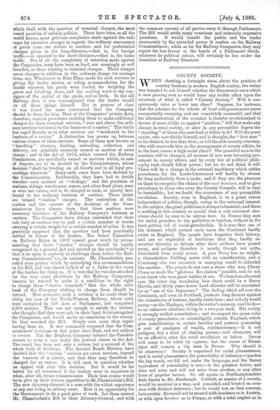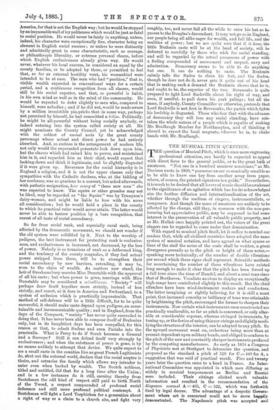COUNTY SOCIETY.
WHEN chatting, a fortnight since, about the position of country bankers in modern English society, the writer was tempted to ask himself whether the Democratic wave which is now passing over us would have any visible effect upon the structure of what is called " County Society." Will it con- spicuously raise or lower any class ? Suppose, for instance, that the schemes for the reform of local self-government prove unexpectedly sweeping, and are completely successful, and that the administration of the counties is thereby revolutionised in favour of mere ability as against "position ;" will that make any change in rural society, or alter in any perceptible degree the " standing " of those who now lead or follow in it ? Will the great squire, who now thinks himself, and is thought, the " first man " in his district, be less than first; or will the able country attorney, who will supersede him in the management of county affairs, be in the least nearer a high social place The powerful men in the counties will be changed, all manner of new men becoming pro- minent in county affairs, and by every law of political philo- sophy rank should follow power; but we do not think it will. There will be a change in the external machinery which settles precedence, for the Lords-Lieutenant will hardly be chosen for long exclusively from a caste; and if they are, the pressure on them to recognise the claims of the nevi homines, and to give precedence to those who sway the County Councils, will in time be irresistible; but we doubt the occurrence of any perceptible revolution. Society, even in England, is to a great extent independent of politics, though, owing to the universal interest in the subject, the great politician is always influential ; and there is nothing in this country so special that a rule universal else- where should be seen to be untrue here. In France they sent the social grandees to the guillotine in batches, without in the least getting rid of social grandeeship. It is true that one of the defences which protect caste upon the Continent hardly exists in England. The people have forgotten their history, and are so neglectful of traditions that they hardly re- member victories or defeats after their authors have passed away, and pedigree therefore is nearly, though not quite, dissociated from social power. A poor Percy has no weight, a characterless Fielding meets with no consideration, and a Courtenay who was eccentric or annoying would be ridiculed like another. The people do not care a straw who won Chevy Chase or made the "glorious Revolution" possible, and do not even know who won great battles at sea. We heard an educated man the other day wondering how there could be a Baron Hawke, and thirty years hence. Lord Alcester will be accounted for as "one of the Seymours." The feeling which all over the Continent, and even in Scotland, protects long descent against the vicissitudes of fortune, hardly exists here ; and nobody would uncap—as the Mackays, within the writer's memory, used to do— to an unknown chieftain living in a two-pair back. But society is strongly welded nevertheless ; and we suspect the queer rules of county precedence, so unintelligible outside England, which give consideration to certain families and persons possessing a sort of amalgam of wealth, continuousness,—it is not pedigree, but a kind of staying power,—and character, will be as effective after the rural revolution as before. Devon will cease to be ruled by squires ; but the owner of Broad- clyst will remain a big man in Devon. Why should it be otherwise ? " Society is organised for social pleasantness, and in social pleasantness the potentiality of intimacy—(pardon the big words, we did not make the language, and the Saxon equivalent of potentiality is not)—is the greatest factor, and does not arise and will not arise from election, or any other form of popular favour. No old squire in Northamptonshire feels drawn to Mr. Bradlaugh. Cobbett, as master of a county, would be received in a way, and consulted, and treated on occa- sion with distinct deference ; but he would not, on that account, be in society. He would not be treated with insolence as in Austria, or with open hauteur as in France, or with a total neglect as in
America, for that is not the English way; but he would be stopped by an impassable wall of icy politeness which would be just as fatal to social position. He would never be fairly in anything, unless, indeed, his character were exceptionally fine, character being an element in English social success ; or unless he were distinctly and admittedly great in some characteristic, such as courage, or philanthropic liberality, or extreme personal charm, before which English exclusiveness already gives way. He would never, whatever his local success, be considered an equal by the county families, or be adopted by them, or permitted to feel that, so far as external hostility went, his womankind were intended to be at ease. The man who had "position," that is, visible wealth expended in conventional ways for a certain period, and a continuous recognition from all classes, would still be his social superior, and that, so powerful is habit, in his own mind as well as in the mind of the community. He would be expected to defer slightly to men who, compared to himself, were nobodies ; and if he did not, would be made aware by a million irresistible pin-pricks that in some way, perhaps not perceived by himself, he had committed a bellse. Politically, he might be all-powerful without being socially anybody, or indeed entering into the system called society at all. He might nominate the County Council, yet be acknowledged with the coldest of casual nods by the great county personage whose actual and direct power he had entirely absorbed. And, so curious is the arrangement of modern life, not only would the superseded potentate look down upon him, but the classes which had raised him to power, and maintained him in it, and regarded him as their chief, would expect that looking-down and think it legitimate, and be slightly disgusted if it were given up. Reverence for the social hierarchy is in England a religion, and it is not the upper classes only that sympathise with the Catholic duchess, who, at the bidding of her confessor, was so gracious to a convert, but asked afterwards, with pathetic resignation, how many of "these new men" she was expected to know. The squire or other grandee may not be liked, may be regarded as "the Squire" was by Tennyson's dairy-woman, and might be liable to lose with his acres all consideration ; but he would hold a place in the county to which its practical ruler would never attain. The latter would never be able to bestow position by a bare recognition, that surest of all tests of social ascendancy.
So far from social rank, and especially rural rank, being affected by the democratic movement, we should not wonder if the old system were solidified by it. Next to the worship of pedigree, the best instrument for protecting rank is exclusive- ness, and exclusiveness is increased, not decreased, by the loss of power. 'Nobody is so tenacious of rank as a dethroned king, and the tendency of the county magnales, if they find actual power stripped from them, will be to strengthen their social ascendancy by new barriers, extending, it may be, even to the claim of wealth. As matters now stand, the heir of Greshamsbury marries Miss Dunstable with the approval of all his caste ; but when power is gone, marriage with Miss Dunstable may be considered a m4salliance. " Society " will perhaps draw itself together more -strictly, instead of less strictly, and resort, as it does in America and Switzerland, to a system of seclusion which is practically impenetrable. That method of self-defence will be a little difficult, for to be quite successful, it should make caste depend upon pedigree, an ascer- tainable and incommunicable quality ; and in England, from the days of the Conquest, " society" has never quite succeeded in doing that. It has never been able to compose itself of Brahmins only, but in its haughtiest days has been compelled, for this reason or that, to admit Sudras and even Pariahs into the penetralia. What is Percy to do if Scrub becomes a General and a Scroope P Still it can defend itself very strongly by exclusiveness ; and when the substance of power is gone, is by no means unlikely to attempt that device. We quite expect to see a small caste in the counties live as great French Legitimists do, shut out the external world, declare that the social sceptre is theirs, and ostracise the family which allows any intruder to enter even when backed by wealth. The Scotch noblesse, titled and untitled, did that for a long time after the Union ; and in a few instances do it still, earning thereby from Scotchman the odd kind of respect still paid to birth North of the Tweed, a respect compounded of profound social deference and still more profound political contempt. A Scotchman will fight a Lord Torphichen for a generation about a right of way or a claim to a church site, and fight very roughly, too, and never fail all the while to raise his hat as he passes to theDouglas's descendant. It may not go so in England, our people being all alike eager for wealth, and full life, and the realities of power; but we are quite sure that if it does, the little Brahmin caste will be at the head of society, will be deferred to carefully by those who wish for social standing, and will be regarded by the actual possessors of power with a feeling compounded of amusement and respect, envy and admiration. Democracy seems to be able to do anything but one. It can do nothing to caste. The Brahmin calmly tells the Sudra to clean his feet, and the Sudra, though he does not do it, never gets it quite out of his head that in making such a demand the Brahmin shows that he is, and ought to be, the superior of the two. Sevenoaks is quite prepared to fight Lord Sackville about his right of way, and even, if needful, to pull down his park palings ; but all the same, if anybody, County Councillor or otherwise, pretends that Lord Sackville is not first in Sevenoaks, the parish which fights his lordship is disgusted. Those who fear that with the advance of democracy they will lose any social standing, have mis- taken the whole nature of a people which is capable of making Mr. Bradlaugh Member for Northampton, and of thinking it absurd to expect the local magnate, whoever he is, to shake hands with Mr. Bradlaugh.



































 Previous page
Previous page